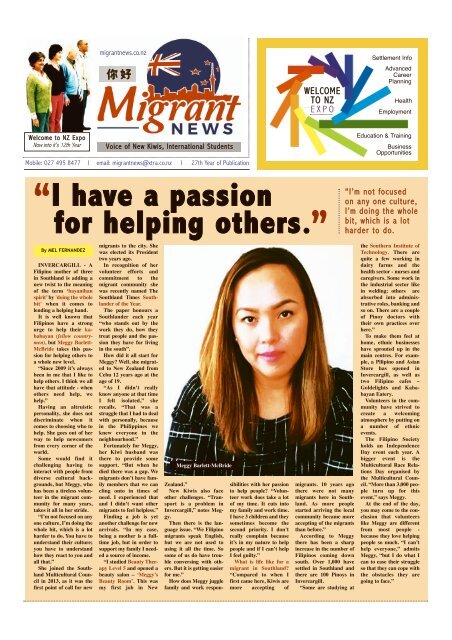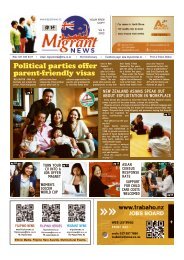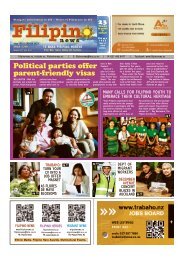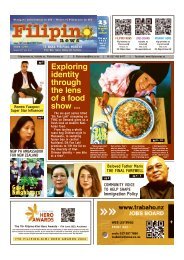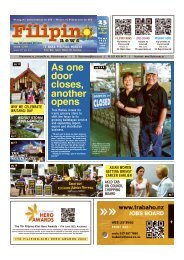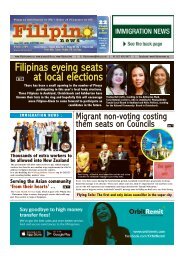Migrant News Jan 2018
www.migrantnews.nz, New Zealand's only newspaper for new settlers since 1991. migrantnews@xtra.co.nz
www.migrantnews.nz, New Zealand's only newspaper for new settlers since 1991. migrantnews@xtra.co.nz
You also want an ePaper? Increase the reach of your titles
YUMPU automatically turns print PDFs into web optimized ePapers that Google loves.
migrantnews.co.nz<br />
WELCOME<br />
TO NZ<br />
EXPO<br />
Settlement Info<br />
Advanced<br />
Career<br />
Planning<br />
Health<br />
Employment<br />
Welcome to NZ Expo<br />
Now into it’s 12th Year<br />
Voice of New Kiwis, International Students<br />
Mobile: 027 495 8477 I email: migrantnews@xtra.co.nz I 27th Year of Publication<br />
Education & Training<br />
Business<br />
Opportunities<br />
“I have a passion<br />
for helping others.”<br />
“I’m not focused<br />
on any one culture,<br />
I’m doing the whole<br />
bit, which is a lot<br />
harder to do.<br />
By MEL FERNANDEZ<br />
INVERCARGILL - A<br />
Filipino mother of three<br />
in Southland is adding a<br />
new twist to the meaning<br />
of the term ‘bayanihan<br />
spirit’ by 'doing the whole<br />
bit' when it comes to<br />
lending a helping hand.<br />
It is well known that<br />
Filipinos have a strong<br />
urge to help their kababayan<br />
(fellow countrymen),<br />
but Meggy Barlett-<br />
McBride takes this passion<br />
for helping others to<br />
a whole new level.<br />
“Since 2009 it’s always<br />
been in me that I like to<br />
help others. I think we all<br />
have that attitude - when<br />
others need help, we<br />
help.”<br />
Having an altruistic<br />
personality, she does not<br />
discriminate when it<br />
comes to choosing who to<br />
help. She goes out of her<br />
way to help newcomers<br />
from every corner of the<br />
world.<br />
Some would find it<br />
challenging having to<br />
interact with people from<br />
diverse cultural backgrounds,<br />
but Meggy, who<br />
has been a tireless volunteer<br />
in the migrant community<br />
for many years,<br />
takes it all in her stride.<br />
“I’m not focused on any<br />
one culture, I’m doing the<br />
whole bit, which is a lot<br />
harder to do. You have to<br />
understand their culture;<br />
you have to understand<br />
how they react to you and<br />
all that.”<br />
She joined the Southland<br />
Multicultural Council<br />
in 2013, as it was the<br />
first point of call for new<br />
migrants to the city. She<br />
was elected its President<br />
two years ago.<br />
In recognition of her<br />
volunteer efforts and<br />
commitment to the<br />
migrant community she<br />
was recently named The<br />
Southland Times Southlander<br />
of the Year.<br />
The paper honours a<br />
Southlander each year<br />
“who stands out by the<br />
work they do, how they<br />
treat people and the passion<br />
they have for living<br />
in the south”.<br />
How did it all start for<br />
Meggy? Well, she migrated<br />
to New Zealand from<br />
Cebu 12 years ago at the<br />
age of 19.<br />
“As I didn’t really<br />
know anyone at that time<br />
I felt isolated,” she<br />
recalls. “That was a<br />
struggle that I had to deal<br />
with personally, because<br />
in the Philippines we<br />
knew everyone in the<br />
neighbourhood.”<br />
Fortunately for Meggy,<br />
her Kiwi husband was<br />
there to provide some<br />
support. “But when he<br />
died there was a gap. We<br />
migrants don’t have family<br />
members that we can<br />
cling onto in times of<br />
need. I experienced that<br />
and I didn’t want other<br />
migrants to feel helpless.”<br />
Finding a job is yet<br />
another challenge for new<br />
arrivals. “In my case,<br />
being a mother is a fulltime<br />
job, but in order to<br />
support my family I needed<br />
a source of income.<br />
“I studied Beauty Therapy<br />
Level 5 and opened a<br />
beauty salon – ‘Meggy’s<br />
Beauty Room’. This was<br />
my first job in New<br />
Meggy Barlett-McBride<br />
Zealand.”<br />
New Kiwis also face<br />
other challenges. “Transport<br />
is a problem in<br />
Invercargill,” notes Meggy.<br />
Then there is the language<br />
issue. “We Filipino<br />
migrants speak English,<br />
but we are not used to<br />
using it all the time. So<br />
some of us do have trouble<br />
conversing with others.<br />
But it is getting easier<br />
for me.”<br />
How does Meggy juggle<br />
family and work responsibilities<br />
with her passion<br />
to help people? “Volunteer<br />
work does take a lot<br />
of my time. It cuts into<br />
my family and work time.<br />
I have 3 children and they<br />
sometimes become the<br />
second priority. I don’t<br />
really complain because<br />
it’s in my nature to help<br />
people and if I can’t help<br />
I feel guilty.”<br />
What is life like for a<br />
migrant in Southland?<br />
“Compared to when I<br />
first came here, Kiwis are<br />
more accepting of<br />
migrants. 10 years ago<br />
there were not many<br />
migrants here in Southland.<br />
As more people<br />
started arriving the local<br />
community became more<br />
accepting of the migrants<br />
than before.”<br />
According to Meggy<br />
there has been a sharp<br />
increase in the number of<br />
Filipinos coming down<br />
south. Over 1,000 have<br />
settled in Southland and<br />
there are 100 Pinoys in<br />
Invercargill.<br />
“Some are studying at<br />
the Southern Institute of<br />
Technology. There are<br />
quite a few working in<br />
dairy farms and the<br />
health sector - nurses and<br />
caregivers. Some work in<br />
the industrial sector like<br />
in welding; others are<br />
absorbed into administrative<br />
roles, banking and<br />
so on. There are a couple<br />
of Pinoy doctors with<br />
their own practices over<br />
here.”<br />
To make them feel at<br />
home, ethnic businesses<br />
have sprouted up in the<br />
main centres. For example,<br />
a Pilipino and Asian<br />
Store has opened in<br />
Invercargill, as well as<br />
two Filipino cafes –<br />
Goldelights and Kababayan<br />
Eatery.<br />
Volunteers in the community<br />
have strived to<br />
create a welcoming<br />
atmosphere by putting on<br />
a number of ethnic<br />
events.<br />
The Filipino Society<br />
holds an Independence<br />
Day event each year. A<br />
bigger event is the<br />
Multicultural Race Relations<br />
Day organised by<br />
the Multicultural Council.<br />
“More than 3,000 people<br />
turn up for this<br />
event,” says Meggy.<br />
At the end of the day,<br />
you may come to the conclusion<br />
that volunteers<br />
like Meggy are different<br />
from most people -<br />
because they love helping<br />
people so much. “I can’t<br />
help everyone,” admits<br />
Meggy, “but I do what I<br />
can to ease their struggle<br />
so that they can cope with<br />
the obstacles they are<br />
going to face.”
P a g e 0 2 w w w . m i g r a n t n e w s . n z I M i g r a n t N e w s : W e l c o m e t o N e w Z e a l a n d E x p o I <strong>Migrant</strong> Job Board<br />
Dr Hashem Slaimankhel<br />
Suicide bomber<br />
kills peaceful<br />
community leader<br />
KABUL, Afghanistan -<br />
Police paid tribute to Dr<br />
Hashem Slaimankhel,<br />
the Kiwi community<br />
leader who was killed<br />
last month while travelling<br />
in Afghanistan.<br />
Dr Slaimankhel was<br />
among at least 100 people<br />
known to have died<br />
when a suicide bomber<br />
drove an ambulance into<br />
a crowded Kabul street.<br />
Police staff worked<br />
closely with Dr Slaimankhel<br />
through interfaith<br />
events, family harm<br />
initiatives and refugee<br />
resettlement activities,<br />
noting his warmth and<br />
generosity toward members<br />
of all communities.<br />
Assistant Commissioner<br />
Wally Haumaha<br />
said that Dr Slaimankhel<br />
was a strong advocate<br />
for former refugees and<br />
ethnic communities.<br />
“I join with the local<br />
community in mourning<br />
the loss of a dedicated<br />
and deeply respected<br />
community leader,” said<br />
Wally.<br />
“I and others within<br />
the Police will remember<br />
Dr Slaimankhel as a<br />
peaceful and hard-working<br />
man, who was committed<br />
to helping others<br />
to settle and thrive in<br />
New Zealand.”<br />
Dr Slaimankhel, of<br />
Auckland, trained as a<br />
doctor in Afghanistan<br />
and arrived in New<br />
Zealand as a refugee in<br />
the late 1980s.<br />
He was an elder of the<br />
New Zealand Muslim<br />
Association's Shura<br />
Committee and chairman<br />
of the Umma Trust,<br />
which provides social<br />
and community services<br />
for refugee and migrant<br />
communities. He was<br />
previously chairman of<br />
the Afghan Association<br />
of New Zealand.<br />
Dr Slaimankhel had<br />
been visiting family in<br />
Afghanistan and was due<br />
back in New Zealand at<br />
the end of <strong>Jan</strong>uary.<br />
“His relationship with<br />
the Police’s MÇori<br />
Pacific and Ethnic<br />
Services and Ethnic<br />
Liaison Officers extended<br />
for 15 years and Dr<br />
Slaimankhel was a greatly<br />
valued and appreciated<br />
community partner,”<br />
said Wally.<br />
“His commitment to<br />
family violence prevention<br />
has changed lives<br />
and helped make our<br />
country a safer place.”<br />
Photo credit: NZ Police<br />
HUTT MULTICULTURAL FESTIVAL<br />
AND HOLI FESTIVAL <strong>2018</strong><br />
3 March <strong>2018</strong><br />
11am - 3pm<br />
Venue: Naenae Community Hall<br />
39 Treadwel Street<br />
Naenae, Lower Hutt<br />
Food, Arts and Crafts, Air Castle for kids<br />
All welcome!<br />
New approach<br />
to sponsoring<br />
refugees launched<br />
WELLINGTON - Four<br />
community-based organisations<br />
will be the first in New<br />
Zealand to sponsor refugees<br />
under a ground-breaking<br />
new approach, says<br />
Immigration Minister Iain<br />
Lees-Galloway.<br />
The refugees are planned<br />
to arrive here by June <strong>2018</strong>.<br />
Caritas Aotearoa New<br />
Zealand (Wellington),<br />
Gleniti Baptist Church<br />
(Timaru), South West<br />
Baptist Church (Christchurch)<br />
and the Society of<br />
St Vincent de Paul<br />
(Nelson) have been chosen<br />
by Immigration New<br />
Zealand (INZ) to become<br />
approved sponsors for the<br />
pilot of the Community<br />
Organisation Refugee<br />
Sponsorship Category.<br />
“This new approach will<br />
help bring communities<br />
together, so they can feel<br />
involved in supporting<br />
refugees to settle into New<br />
It will be easier for the<br />
building industry to find the<br />
workers it needs to help<br />
address New Zealand’s<br />
housing shortfall, with seven<br />
building-related occupations<br />
being added to the<br />
Immediate Skill Shortage<br />
List (ISSL), Immigration<br />
Minister Iain Lees-Galloway<br />
announced recently.<br />
“The Government will<br />
build 100,000 affordable<br />
homes over the next 10<br />
years and the construction<br />
industry needs skilled workers<br />
to achieve this,” Mr<br />
Lees-Galloway says.<br />
“The Government will<br />
always ensure that where a<br />
genuine skill gap exists our<br />
immigration system will<br />
support employers to get the<br />
people they need.<br />
“Adding these seven<br />
building-related occupations<br />
to the ISSL will make it easier<br />
for employers to get the<br />
people they require, including<br />
migrants, to deliver the<br />
homes this country needs.<br />
“Employing skilled migrants<br />
will meet the immediate<br />
demand for people with<br />
the skills required to rapidly<br />
increase the number of houses<br />
in New Zealand. In the<br />
near future KiwiBuild will<br />
be a catalyst for more young<br />
New Zealanders to work in<br />
the construction industry.”<br />
Employers whose occupations<br />
are on the ISSL and the<br />
Long Term Skill Shortage<br />
List (LTSSL) do not need to<br />
go through the labour market<br />
process and do not need<br />
to prove they cannot find a<br />
New Zealander for the job.<br />
A total of 34 occupations<br />
have been reviewed this<br />
year. In addition to the seven<br />
building-related occupations<br />
three motor industry-related<br />
professions are being added<br />
to the ISSL, as well as midwives<br />
and accountants. Five<br />
occupations are being<br />
removed from the ISSL and<br />
five from the LTSSL.<br />
The removal and addition<br />
of occupations is the result<br />
of extensive consultation<br />
with industry groups, other<br />
stakeholders and relevant<br />
government agencies, alongside<br />
analysis of economic,<br />
labour market and immigration<br />
data.<br />
“I want to emphasise that<br />
employers wanting to bring<br />
in migrant workers for occupations<br />
not listed on the<br />
ISSL or LTSSL can still do<br />
so, as long as they can show<br />
they’ve genuinely searched<br />
for suitably qualified and<br />
trained New Zealand workers,”<br />
says Mr Lees-<br />
Galloway.<br />
Zealand life,” Mr Lees-<br />
Galloway says.<br />
“With this grassroots<br />
approach come positive<br />
social, economic and cultural<br />
benefits, both for the<br />
community and the resettled<br />
refugees.”<br />
The four organisations<br />
will help 25 refugees to settle<br />
into their communities;<br />
the services they will provide<br />
will include: the provision<br />
of furnished housing,<br />
helping them navigate their<br />
community and the services<br />
they need (such as enrolling<br />
in GPs and schooling),<br />
English language classes,<br />
and support towards paid<br />
employment and self-sufficiency.<br />
Mr Lees-Galloway says<br />
the sponsored refugees will<br />
participate in a tailored twoweek<br />
reception programme<br />
at the Mangere Refugee<br />
Resettlement Centre prior<br />
to settling in the communities<br />
with the settlement support<br />
provided by their<br />
approved community organisation<br />
sponsor.<br />
“The Community Organisation<br />
Refugee Sponsorship<br />
Category is only one of the<br />
ways this Government is<br />
committed to supporting<br />
some of the world’s most<br />
vulnerable people to rebuild<br />
their lives and thrive in New<br />
Zealand. This is in addition<br />
to and complements our<br />
existing refugee quota.”<br />
An evaluation of the pilot<br />
programme will be undertaken<br />
by the Ministry of<br />
Business, Innovation and<br />
Employment and completed<br />
by December <strong>2018</strong>.<br />
The evaluation will be<br />
used to inform any future<br />
implementation of the new<br />
category.<br />
Building occupations added to skill shortage list<br />
“I also want to signal that<br />
New Zealanders will be<br />
given every opportunity to<br />
get work and better opportunities<br />
to train and learn<br />
through our Fees Free initiative,<br />
so future reviews of the<br />
skill shortage lists will be<br />
carried out with a view to<br />
reducing the number of<br />
occupations listed.<br />
“The Government is committed<br />
to matching skilled<br />
migrant workers with the<br />
industries and regions that<br />
need them, by strengthening<br />
the labour market test for<br />
work visas and making the<br />
skill shortage lists more<br />
focused on regional needs.<br />
“MBIE officials will be<br />
providing me further advice<br />
on how to achieve this commitment<br />
ahead of the next<br />
review, which is due to<br />
begin in April next year.”<br />
The latest changes are<br />
detailed on the INZ website<br />
here. The revised lists will<br />
come into effect in February<br />
<strong>2018</strong>.
w w w . m i g r a n t n e w s . n z I M i g r a n t N e w s : W e l c o m e t o N e w Z e a l a n d E x p o I <strong>Migrant</strong> Job Board<br />
P a g e 0 3<br />
Tightening of rules puts brakes on the<br />
‘back door’ immigration upsurge<br />
AUCKLAND - It’s official<br />
- the ‘back door’<br />
immigration pathway<br />
used by a large number of<br />
lower-qualified international<br />
students to gain residence<br />
in New Zealand<br />
rather than for study purposes<br />
is now a ‘no go’<br />
zone.<br />
The Labour-led government<br />
has kept its election<br />
promise to improve<br />
the integrity of the immigration<br />
system by cracking<br />
down on this anomaly.<br />
As a consequence student<br />
visa applications have<br />
been plummeting.<br />
Radio New Zealand<br />
reports that the number<br />
STUDENT VISA<br />
APPLICATIONS<br />
PLUMMET<br />
of study visa applications<br />
lodged with Immigration<br />
New Zealand in India<br />
plummeted last year, as<br />
did the proportion of<br />
failed applications.<br />
Quoting figures provided<br />
by Immigration New<br />
Zealand, RNZ reports<br />
that the agency's India<br />
staff considered 9429<br />
study visa applications in<br />
2017, down from 16,380 in<br />
2016 and 25,977 in 2015.<br />
They approved 6425 of<br />
the Indian applications<br />
and declined 3004, at a<br />
decline rate of 32 percent,<br />
down from more than 50<br />
percent in 2015 and 2016.<br />
In the Philippines 1148<br />
applicants were approved<br />
last year and 397, or 26<br />
percent, were refused.<br />
Immigration turned<br />
down 368 applications<br />
from applicants in Nepal,<br />
52 percent of the total it<br />
received, while in Sri<br />
Lanka it approved 552<br />
applications and refused<br />
257, or 32 percent.<br />
In Vietnam, 960 applications<br />
were approved<br />
and 296, or 24 percent,<br />
were refused.<br />
In China, 7327 applications<br />
were approved and<br />
542 were declined, for a<br />
decline rate of 7 percent.<br />
The media is rife with<br />
reports of international<br />
B Y M E L F E R N A N D E Z<br />
students who focus on residency<br />
rather than study<br />
being more open to potential<br />
exploitation from an<br />
employer.<br />
"This is<br />
leaving<br />
them open<br />
to accepting<br />
arrangements<br />
to<br />
buy job<br />
offers, and<br />
thus become<br />
a<br />
party to<br />
immigration<br />
fraud,<br />
in order to<br />
gain residence,"<br />
reports the<br />
New Zealand<br />
Herald,<br />
quoting<br />
officials<br />
advising<br />
the government<br />
on<br />
immigration<br />
policy.<br />
T h e<br />
Labour<br />
Party’s fact<br />
sheet on ‘Making immigration<br />
work for New<br />
Zealand’, issued in June<br />
last year, may provide an<br />
insight to the way forward.<br />
“In recent years there<br />
has been a substantial<br />
increase in low-level study<br />
and reports of sham<br />
courses being used as a<br />
route to work and eventual<br />
residency.<br />
“Many stories have<br />
emerged of people being<br />
exploited, both in their<br />
home countries and in<br />
New Zealand, by people<br />
offering study as a back<br />
door to residency.<br />
“Labour is focused on<br />
our international education<br />
system delivering<br />
high-quality education<br />
that delivers a real return<br />
for New Zealand and does<br />
not put unnecessary pressure<br />
on our infrastructure.<br />
Quality education must<br />
stand on its own merits.”<br />
MIGRANT JOB BOARD<br />
Click on the <strong>Migrant</strong> Job Search banner<br />
on the following websites<br />
for job listings.<br />
filipinonews.nz, pinoynzlife.nz<br />
migrantnews.nz, filipino.kiwi<br />
Advertisers, take advantage of low, low rates<br />
to list your jobs instantly<br />
on this <strong>Migrant</strong> Job Board.<br />
To list vacancies please email for details:<br />
migrantnews@xtra.co.nz or text: 027 495 8477
P a g e 0 4 w w w . m i g r a n t n e w s . n z I M i g r a n t N e w s : W e l c o m e t o N e w Z e a l a n d E x p o I <strong>Migrant</strong> Job Board<br />
Rental crisis - time for action?<br />
RENTAL MARKET CRISIS LOOMING, SAYS PROPERTY INSTITUTE<br />
Following a 100% ‘hit<br />
rate’ on its housing market<br />
predictions for 2017 –<br />
the Property Institute has<br />
now released its predictions<br />
for <strong>2018</strong>.<br />
According to the<br />
Institute CEO, Ashley<br />
Church, the cost of renting<br />
will replace the price<br />
of housing as the #1 housing<br />
issue in <strong>2018</strong> – and the<br />
housing polices of the new<br />
Government, combined<br />
with uncertainty around<br />
housing investment over<br />
the next few years, will<br />
‘scare’ some property<br />
investors out of the market<br />
- creating a growing<br />
crisis with the number of<br />
dwellings available for<br />
rental.<br />
The full list of predictions<br />
are as follows:<br />
Some Property Investors<br />
will abandon the<br />
market and the impact of<br />
this, on the availability of<br />
rentals, will start to<br />
become a problem in the<br />
second half of <strong>2018</strong>.<br />
“The cycles of property<br />
investment are largely<br />
predictable – there are<br />
always a number of less<br />
experienced property<br />
investors who panic, and<br />
sell, when a market flattens<br />
- or who decide not to<br />
invest further during<br />
downturns. This means<br />
that an increasing number<br />
of rentals will convert<br />
to owner occupied<br />
dwellings – putting pressure<br />
on the rental market<br />
at a time when the<br />
demand for housing<br />
(rental and owner occupied)<br />
is already acute.<br />
This trend is already<br />
noticeable in the dramatic<br />
reduction in new investor<br />
mortgages observed in<br />
the Monthly Property<br />
Institute/Valocity<br />
Regional Trends reports<br />
in the latter half of 2017.”<br />
The cost of renting will<br />
continue to rise and this<br />
will replace the cost of<br />
housing as the number<br />
one housing issue in <strong>2018</strong>.<br />
“While it’s normal to<br />
see rent increases in the<br />
period following a property<br />
boom – the environment<br />
in which they will<br />
take place in <strong>2018</strong> will be<br />
made worse as a result of<br />
the combined effect of<br />
unusually high inward<br />
migration (which has<br />
exacerbated rental demand),<br />
loan to value<br />
restrictions (which have<br />
closed investors out of the<br />
market) and Labour’s<br />
plans for Capital Gains<br />
taxes, ring-fenced tax<br />
losses and significant new<br />
compliance costs (which<br />
will cause many property<br />
investors to increase rents<br />
to offset new costs - real or<br />
feared). As a result, we’re<br />
in for big rent increases in<br />
some parts of the country<br />
over the next couple of<br />
years – with those<br />
increases already showing<br />
up in the Property<br />
Institute Regional Insights<br />
Report.”<br />
House prices will continue<br />
to flatten throughout<br />
<strong>2018</strong> – but there will<br />
be no ‘crash’ in property<br />
prices.<br />
“The latest Property<br />
Institute/Valocity Regional<br />
Insights report shows<br />
that median house price<br />
growth across the country<br />
is down to 0.6% year by<br />
year. This is consistent<br />
with the end of a property<br />
cycle and overall prices<br />
(particularly in Auckland)<br />
will now ‘see-saw’<br />
between small increases<br />
and small decreases<br />
throughout <strong>2018</strong>. There<br />
will be isolated exceptions<br />
to this trend (both up and<br />
down) around the country<br />
– but the much hyped<br />
‘property crash’ isn’t<br />
going to happen. We also<br />
note that the latest<br />
Property Institute/ Valocity<br />
data shows expensive<br />
houses continuing to sell<br />
and holding up the median<br />
house price numbers –<br />
and we don’t see that<br />
trend changing much.”<br />
Longer term Mortgage<br />
interest rates will continue<br />
to rise. Expect further<br />
increases of up to 0.5% or<br />
more.<br />
“As was the case in<br />
2017, the general consensus<br />
is that interest rates<br />
are on their way up –<br />
partly because of uncertainty<br />
around international<br />
events and partly<br />
because NZ banks will<br />
need to pay more to<br />
attract diminishing investment<br />
funds from kiwi<br />
depositors.<br />
Expect to see little<br />
change in six-month to<br />
two-year mortgage rates<br />
– but a jump of up to<br />
0.5% (or more) in longer<br />
term rates as banks try<br />
and woo borrowers into<br />
shorter terms in anticipation<br />
of further increases<br />
in the cost of funding over<br />
the next two or three<br />
years.”<br />
New home construction<br />
in Auckland will slowly<br />
increase – but most of it<br />
will be for owner occupiers.<br />
“Depending on your<br />
source, Auckland either<br />
needs 40,000 new homes<br />
‘right now’ or 10,000 per<br />
year for the foreseeable<br />
future. Either way, the<br />
market will continue to<br />
make further progress on<br />
this target in <strong>2018</strong> but will<br />
still fall a long way short<br />
of the number of<br />
dwellings required to ‘fix’<br />
the shortage. These houses<br />
will be built through a<br />
combination of Government<br />
building initiatives<br />
and private sector construction<br />
of apartments<br />
and free-standing homes.<br />
Most of these dwellings<br />
will end up in the hands of<br />
owner occupiers, with<br />
very few becoming rentals<br />
for the reasons outlined<br />
in the previous predictions.”<br />
The Loan-to-Value<br />
rules will be further<br />
relaxed.<br />
“The cyclic flattening in<br />
house prices will give the<br />
Reserve Bank the confidence<br />
to further relax the<br />
LVR deposit rules on<br />
Investors and also to give<br />
relief to Home Buyers in<br />
<strong>2018</strong>. The LVR for<br />
Investors will drop to<br />
30% during <strong>2018</strong> – while<br />
the LVR for Home Buyers<br />
will either be dropped to<br />
10% or 15% (although<br />
this may be limited to First<br />
Home Buyers) or the<br />
‘speed limit’ (the extent to<br />
which trading banks can<br />
have clients who exceed<br />
this limit) will be significantly<br />
increased.”<br />
Property Institute/Valocity<br />
Regional Insights<br />
Report.<br />
Meanwhile – the New<br />
Zealand housing market<br />
has continued to maintain<br />
a holding pattern, according<br />
to the latest results of<br />
the Property Institute<br />
/Valocity Regional Insights<br />
report.<br />
According to the report,<br />
the median sales price<br />
across New Zealand<br />
strengthened marginally<br />
to $503k in December (up<br />
from $483k in November),<br />
while sales volumes<br />
nationwide continued to<br />
go down with 4,942 properties<br />
sold in December<br />
2017 – a 44% drop from<br />
the same period last year.<br />
Mr Church also notes<br />
that, according to the<br />
Valocity data, first home<br />
buyers are still accounting<br />
for around 28% of all<br />
new mortgages across the<br />
country – while ‘refinanciers’<br />
now represent<br />
22% of all new lending.<br />
Free email subscription to ‘<strong>Migrant</strong> <strong>News</strong>’ : www.migrantnews.nz<br />
Get on our database and you will be provided a link to read the latest edition of MIGRANT NEWS free :<br />
migrantnews@xtra.co.nz
Asian <strong>Migrant</strong> <strong>News</strong><br />
Reach the<br />
broader<br />
Asian<br />
market!<br />
Filipino <strong>Migrant</strong> <strong>News</strong><br />
One-third of Aucklanders will be ASIANS BY 2021.<br />
Time to reach this market!<br />
ASIAN NEWS - asia2nz.com<br />
MIGRANT NEWS - migrantnews.nz<br />
FILIPINO NEWS - filipinonews.nz<br />
TRAVEL GALORE - travelgalore.nz<br />
mobile: 027 495 8477 email: migrantnews@xtra.co.nz<br />
TOO GOOD TO MISS OUT ON!<br />
Keep it coming!<br />
Complimentary copies run out<br />
pretty fast at designated pick-up points.<br />
So reserve your personal copy.<br />
SUBSCRIBE TODAY!<br />
ASIAN NEWS - asia2nz.com<br />
MIGRANT NEWS - migrantnews.nz<br />
FILIPINO NEWS - filipinonews.nz<br />
6 issues - NZ$29 * 12 issues - NZ$55*<br />
<strong>Migrant</strong> <strong>News</strong> issues FILIPINO <strong>Migrant</strong> <strong>News</strong> issues<br />
Name/Company .....................................................................................<br />
Address .................................................................................................<br />
............................................................................................................<br />
Amount paid .................................... cheque payable to SM Publications Ltd<br />
or Direct Credit to SM Publications, ASB Bank Acct No: 123 042 0427727 00<br />
or Paypal: filipinonews@xtra.co.nz / or send us an email requesting an Invoice<br />
your email address............................................or tel................................<br />
* Rates quoted for mail delivery in New Zealand; this is a promotional rate for a limited period only


